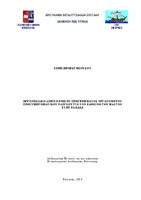Οργανωσιακή δομή εθνικού προγράμματος οργανωμένου προσυμπτωματικού ελέγχου για τον καρκίνο του μαστού στην Ελλάδα.
Organizational structure of a national breast cancer screening programme in Greece.

Προβολή/
Θεματική επικεφαλίδα
Μαστός -- Καρκίνος ; Καρκίνος -- Πρόληψη ; Medical screening -- Greece ; Breast -- Cancer -- GreeceΠερίληψη
Ο καρκίνος του μαστού αποτελεί τη συχνότερη μορφή κακοήθους νόσου και τη συχνότερη αιτία θανάτου στο γυναικείο φύλο, παγκοσμίως. Αν και η συχνότητα εμφάνισης της νόσου στην Ελλάδα καταγράφεται ως μία από τις χαμηλότερες στην Ευρώπη, μέσα στα επόμενα χρόνια αναμένεται αλματώδης αύξηση των κρουσμάτων αναδεικνύοντας τον καρκίνο του μαστού ως ένα κορυφαίο ζήτημα δημόσιας υγείας. Ο προσυμπτωματικός έλεγχος ή δευτερογενής πρόληψη συνιστά ένα αποτελεσματικό μέτρο για την πρώιμη και έγκαιρη ανίχνευση του καρκίνου του μαστού. Αποφέρει σημαντικά οφέλη για το άτομο και το κοινωνικό σύνολο, καθώς συνεισφέρει στη μείωση της θνησιμότητας και νοσηρότητας από τη νόσο. Προϋπόθεση για τη μεγιστοποίηση του οφέλους είναι η διεξαγωγή οργανωμένου προσυμπτωματικού ελέγχου στο πλαίσιο συγκεκριμένων πολιτικών υγείας. Τα περισσότερα Ευρωπαϊκά κράτη έχουν ήδη προχωρήσει στην υλοποίηση και εφαρμογή προγραμμάτων οργανωμένου προσυμπτωματικού ελέγχου, σύμφωνα με τις Ευρωπαϊκές συστάσεις. Αντίθετα, στην Ελλάδα ο προσυμπτωματικός έλεγχος για τον καρκίνο του μαστού είναι κυρίως ευκαιριακός. Η παρούσα μελέτη αποσκοπεί στον προσδιορισμό της οργανωσιακής δομής ενός προγράμματος οργανωμένου προσυμπτωματικού ελέγχου για τον καρκίνο του μαστού στην Ελλάδα, προσαρμοσμένο στην εγχώρια επιδημιολογία της νόσου, στα χαρακτηριστικά του ελληνικού συστήματος υγείας, και στις διαθέσιμες υποδομές σε νοσηλευτικά ιδρύματα, εξοπλισμό και ανθρώπινο δυναμικό. Για το σκοπό αυτό, αρχικά μελετήθηκαν εκτενώς τα προγράμματα οργανωμένου προσυμπτωματικού ελέγχου για τον καρκίνο του μαστού στην Ευρώπη, με ιδιαίτερη έμφαση σε τρία Ευρωπαϊκά κράτη. Στη συνέχεια, δεδομένης της βαρύνουσας σημασίας της γνώμης της ελληνικής επιστημονικής κοινότητας, εκπονήθηκε ποιοτική έρευνα σε ομάδα ειδικών με τη μέθοδο της εις βάθος συνέντευξης. Στόχος ήταν ο προσδιορισμός των βασικών χαρακτηριστικών ενός προγράμματος προσυμπτωματικού ελέγχου, των απαιτούμενων υποδομών και των προδιαγραφών λειτουργίας τους. Επίσης, αξιολογήθηκε η δυνατότητα ενσωμάτωσης του προσυμπτωματικού ελέγχου στο ελληνικό σύστημα υγείας, και καθορίστηκε το μοντέλο και οι φορείς οργάνωσης και διαχείρισής του. Τέλος ιδιαίτερη αναφορά γίνεται στην εφικτότητα υλοποίησης και του οικονομικού οφέλους του οργανωμένου προσυμπτωματικού ελέγχου. Τα ευρήματα της μελέτης υποστηρίζουν πως ο οργανωμένος προσυμπτωματικός έλεγχος για τον καρκίνο του μαστού αναφέρεται σε όλες τις υγιείς ελληνίδες ηλικίας 40 έως 74 ετών. Συνίσταται στη διενέργεια μαστογραφίας και κλινικής εξέτασης από εξειδικευμένους επαγγελματίες υγείας, η οποία επαναλαμβάνεται ανά διετία. Ο προσυμπτωματικός έλεγχος διενεργείται σε οργανωμένες Μονάδες Διαγνωστικής Απεικόνισης. Ταυτόχρονα οι Μονάδες Διαγνωστικής Αξιολόγησης και οι Εξειδικευμένες Μονάδες Μαστού αναλαμβάνουν τη διεκπεραίωση περιστατικών με ύποπτα ευρήματα ή διαγνωσμένη νόσο, αντίστοιχα. Όλες οι Μονάδες Μαστού εδράζονται στα δημόσια νοσοκομεία της χώρας και ακολουθούν την ιεραρχική δομή αυτών. Η συμμετοχή του ιδιωτικού τομέα της υγείας είναι ενδεδειγμένη σε περιπτώσεις, όπου οι δημόσιοι φορείς παροχής υπηρεσιών αδυνατούν να καλύψουν τις ανάγκες του πληθυσμού. Η οργάνωση του προσυμπτωματικού ελέγχου ακολουθεί το συγκεντρωτικό μοντέλο. Σύμφωνα με αυτό, ο τοπικός έλεγχος και ο συντονισμός της δράσης κάθε Μονάδας εμπίπτει στις αρμοδιότητες της Ογκολογικής Επιτροπής του Νοσοκομείου στο οποίο εδράζεται. Σε περιφερειακό επίπεδο, το σύστημα διαχειρίζεται από τις Υγειονομικές Περιφέρειες της χώρας μέσω ειδικών επιτροπών. Κεντρική αρχή οργάνωσης, διαχείρισης και ελέγχου του συστήματος είναι ένας εξειδικευμένος φορέας, ο οποίος συγκεντρώνει το σύνολο των αρμοδιοτήτων. Η διασφάλιση της ποιότητας του συστήματος διενεργείται από Ανεξάρτητη Αρχή. Ο συσχετισμός των ευρημάτων της μελέτης χρησιμοποιείται ως πλαίσιο αναφοράς για το σχεδιασμό της οργανωσιακής δομής και τον προσδιορισμό της ροής των διαδικασιών ενός εθνικού προγράμματος προσυμπτωματικού ελέγχου για τον καρκίνο του μαστού στην Ελλάδα. Σύμφωνα με τη γνώμη των ειδικών, μία τέτοια πρωτοβουλία είναι και εφικτή και οικονομικά συμφέρουσα, ακόμα και υπό τις παρούσες δυσμενείς οικονομικές συγκυρίες.

